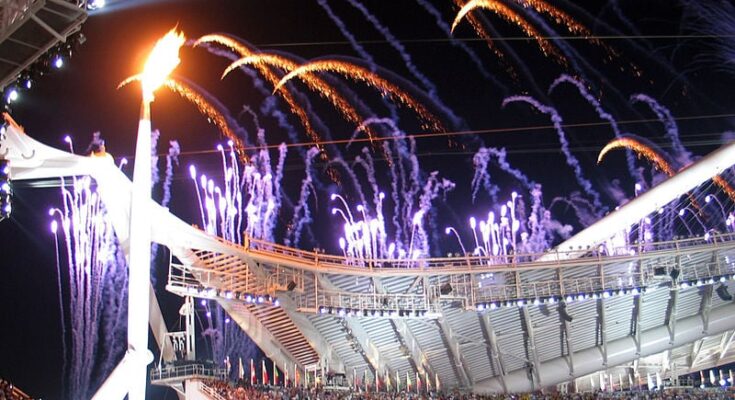On this day in 2004, the Athens Olympics held its historic opening ceremony celebration. Athens had been chosen as the host site for the XXVIII Olympiad at the 106th IOC session in Lausanne, Switzerland on September 5, 1997.
The games marked the homecoming of the Olympics to their birthplace, and the unforgettable opening ceremony rose to the momentous occasion.
What made the 2004 Summer Olympics’ opening ceremony so remarkable
The ceremony, which was lauded by the international press, featured technologies that had never before been employed in any stadium or opening ceremony, including a giant pool with a slip-proof iridescent fiberglass flooring that drained its water in three minutes.
Beautiful, completely innovative lighting, and an ingenious staging system utilizing a complex network of automated cables that lifted, maneuvered, and choreographed floating pieces of sculpture to move in synchronization with the music and narrative of the opening ceremony were also part of the jaw-dropping spectacle.
The ceremony also featured an “artistic section” that showcased Greece’s history to the world. This portion of the show illustrated the culture of both ancient and modern Greece, combining them in a two-part drama that explored the resonance of ancient ideas on Greece’s remarkable present.
The two sections were called “Allegory” and “Clepsydra,” meaning “Hourglass.” The Allegory section featured a poem by Nobel prize winning Greek poet George Seferis titled “Mythistorema 3.” It was a surreal performance that featured centaurs, Cycladic art, and Archaic period architecture.
The second section, Clepsydra, connected ancient Greek civilization to the foundations of human life and existence. The sequence, which employed an actor playing Alexander the Great, displayed images from the Hellenistic period as well as Byzantine art. The last part of the section highlights a pregnant woman, who represents the source of life and all humanity and history. The woman is lowered into a pool of water and the stadium lights create an image of glittering stars in the galaxy.
Nearly 50 world leaders attended the event, in which approximately 15,000 athletes from 202 countries participated. It was a historical first for international television, being the first-ever international broadcast in high-definition, thanks to the US channel NBC and the Japanese channel NHK.
All the skeptics who had warned that a small country like Greece could not efficiently host a complicated and demanding modern event such as the Olympics were completely silenced by Athens’ gargantuan effort.
Years later, two American experts who worked on the Athens 2004 bid and for the Athens Organizing Committee wrote about the amazing experience they had working for the success of the Games:
“The sight of Greeks coming together and delivering a world-class event was deeply impressive and not to be forgotten or dismissed,” Mark Steitz and David Dreyer, senior principals at TSD Communications, wrote in Greek daily Kathimerini.
“You succeeded because of Greek skill, Greek character and Greek work. And, yes, your ability to do things at the last minute. We had heard stories of Greek problems, of past bids for the Games gone awry, of negative national traits. We saw the opposite. We were met with humor, patience and good will. Philoxenia was quite for real,” they added.



